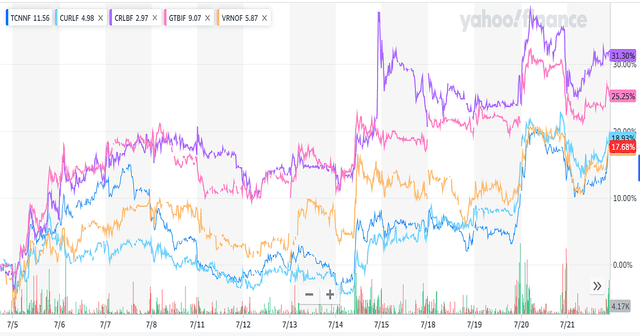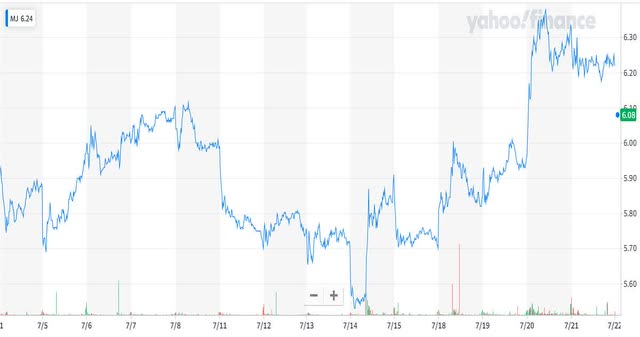Andrew Burton/Getty Images News
Cannabis Reform in Congress
There are many possible paths for cannabis reform in Congress. Federal legalization, decriminalization, removing the unfair tax burden from section 280E, and enabling financial institutions to have legal relationships with cannabis companies are the most often discussed. Any one of these would be a boon for cannabis investors,. causing: 1. immediate change in sentiment 2. immediate boost to businesses. 3. perhaps initiate the next bull leg of cannabis stocks.
The month of July has been a small demonstration of the power of reforms. Announcements were made about proposed legislation on July 14, 19 and 21, and cannabis stocks related instantaneously. The chart and table below shows the reaction of the big five stocks: Trulieve (OTCQX:TCNNF), Curaleaf (OTCPK:CURLF), Green Thumb (OTCQX:GTBIF), Cresco (OTCQX:CRLBF), and Verano (OTCQX:VRNOF):
Big 5 cannabis stocks in July 2022 (Yahoo Finance)
| Gain July 14-21 | Gain July 1-21 | |
| Trulieve | 20.0% | 17.7% |
| Curaleaf | 25.0% | 18.9% |
| Cresco | 15.4% | 31.3% |
| Green Thumb | 9.9% | 25.3% |
| Verano | 11.7% | 17.4% |
Our experience as cannabis investors tells us that these price increases will reverse if there is no legislative progress. But when legislation eventually becomes law, the prices increases move to a durably higher level.
Are the present reform proposals for real? Yes, in that the reform has much support in Congress and among the people. Will the current bills pass in Congress this year? Sorry to disappoint, but it’s not the objective of this report to foretell the passage of current bills. One can guess, but it’s impossible to know, and in any case it has little effect on the investment thesis. But some reform will eventually pass, and when it does it will be huge for cannabis investors. This article builds the investment thesis from that perspective. Investment implications for the industry and specific companies are discussed at the end of the article.
The Current legislative proposals
There are currently two congressional bills that are driving the debate around cannabis.
The Secure and Fair Enforcement Act (SAFE) [hereafter referred to as “SAFE”): In its excellent review, The National Law Review says,
The Act’s stated purpose is to “ensur[e] access to financial services to cannabis-related legitimate businesses and service providers by removing some of the attendant legal and regulatory risks.
It will open up access to the industry by every type of financial institution – banks, brokerages, pension funds, hedge funds, home offices, and the rest. Currently these institutions are almost completely cut off from the industry because Federal anti-money laundering laws do not allow transactions involving funds that an institution believes “may be derived from illegal activity. The SAFE Act would have a huge impact by allowing large amounts of investment money into cannabis and enabling normal business relationships.
The Cannabis Administration and Opportunity Act (CAOA): This act was introduced by senators Chuck Schumer, Ron Wyden, and Corey Booker on July 20, 2022. The Senate news release describes it thus:
The legislation establishes a federal regulatory framework to protect public health and safety, prioritizes restorative and economic justice to help undo the decades of harm caused by the failed War on Drugs, ends discrimination in the provision of federal benefits on the basis of cannabis use, provides major investments for cannabis research, and strengthens worker protections. By decriminalizing cannabis at the federal level, the CAOA also ensures that state-legal cannabis businesses or those in adjacent industries will no longer be denied access to bank accounts or financial services simply because of their ties to cannabis.
In other words, SAFE is a straight financial services bill, and CAOA is comprehensive. CAOA starts with SAFE, but adds complete legalization, restorative and economic justice, and other government support.
Standing of the current reform proposals
SAFE banking has been passed six times in House with bipartisan support, but blocked in the Senate. It has strong support from Schumer, the majority leader, and many believed that it could pass easily on a majority vote. But because of how the Senate works, one Senator can delay or block legislation by himself through the filibuster, and this is where we are. Sen. Corey Booker of NJ, is holding SAFE up and offering CAOA as the alternative (although in fairness Booker also represents the views of many progressive colleagues) . He has said repeatedly he is a big supporter of SAFE, but he believes strongly in the idea of restorative and social justice around cannabis. He wants harsh sentences related to cannabis to be expunged, current sentencing to be reformed, and for marginalized groups that have been disproportionately harmed by cannabis laws to have a substantial seat at the financial table to benefit from the new legal industry. He requires these issues to be addressed simultaneously with any other legislation, fearing that passing anything else would damage the prospects for comprehensive reform. The problem is that getting enough support to pass a such bill in the Senate will be difficult. Progressive senators will not vote for a bill without social reforms, but including the reforms will lose the support of some senators of a more law-and-order or cannabis is a dangerous drug persuasion.
Many Americans question the motives of politicians, and rightfully so. The effect of every utterance and action on future election prospects and campaign money is never far from their minds. But we must acknowledge that they have sincerely held views on issues of importance to them. Sen. Schumer honestly believes that SAFE will be a deserved boon to the industry, correcting the financial inequities they must operate with and help them to grow. Sen. Booker has always been passionate about social and economic injustice. He has often recounted an experience early in his career at a legal clinic at a housing project in Newark that he says changed his life. He saw the pain of men who had spent years struggling to reintegrate into society after low-level, non-violent drug convictions. He recalls a one man saying, “What is it going to take? It’s been over 10 years. What is it going to take for me to get a second chance?”
In my view, investors are best served by viewing the situation as a sincere contest between the philosophy of Sen. Booker (and progressive allies) and what Sen. Schumer can pass in the Senate. We have the ironic standoff of a simple bill that could pass versus a comprehensive bill that’s a dream list for cannabis investors.
Predictions and Non-Predictions
Will Sen. Schumer find enough votes for a clean SAFE bill in 2022? Will a compromise be found? Will the 2022 midterm elections make a difference? If so, after the midterms will a clean SAFE or a compromise be the result? I do not know, and debate about it is like the proverbial question about how many angels can dance on the head of a pin.
What I do know (as much as anyone can truly “know anything) is that cannabis reform is a movement in this country that has steadily increased in power and momentum since California passed the Compassionate Use Act in 1996. The seeds of the movement go back to at least the early 70’s, when those of us in college, like me, realized that smoking hash and pot wouldn’t lead to the insanity and depravity depicted in Reefer Madness (The Movie) This will lead to the passage of any number of reforms, of which SAFE and CAOA are only the most recent examples. As with so much progress in society, reformers keep knocking on the door, even if it takes years, and eventually they are let in.
When Reforms Come to Pass…
When these reforms come to pass, the upward movement of cannabis stocks will be explosive, as demonstrated in the chart and table above. Similar increases occurred across the wider industry, as shown in the broad ETFMG Alternative Harvest ETF (MJ):
Cannabis ETF MJ in July 2022 (Yahoo Finance)
Investment implications — Cannabis Macro
The first issue to address is whether or not this is a good time to invest in cannabis in general. The following factors say the answer is yes:
-
Most stocks are at or below their longer term lows.
-
Most companies are much stronger than they were at previous lows.
-
The industry is at or near the capitulation point, where many investors have lost hope of recouping their losses.
-
In a high-beta industry like cannabis upward moves are often sudden and dramatic.
-
A variety of factors, including legislation or good earnings reports, could reverse sentiment and begin a bull market.
-
Industry projections of up to 25% annual growth for the rest of the decade are undiminished.
One can debate whether cannabis stocks have farther to fall, but the potential upside is much bigger than any remaining downside. If, for example, Green Thumb goes from 10 to 20, you won’t care whether you bought it at 10 or 8.
The second issue is how to incorporate prospects for legislative reform into an investment strategy. A long term view is the most helpful option, given the uncertainties about how and when reform will occur. In the long term, reforms will have a major positive impact on all cannabis companies, so investors are looking at long term gains from reform. In the short term, prices in such a volatile industry could go in either direction, and speculators or traders could continue to be disappointed. Long term investors are advised to being fully invested based on the general positives for the industry delineated above and the fact that meaningful advances in legislation, and consequently share prices, could occur at any time – in the short or long term. Investing now insures that one will be positioned to take advantage of the long term growth in the cannabis industry.
Investment implications – Specific companies
In many respects company-specific implications are not important. Any reform, whether limited like SAFE or more comprehensive like CAOA, will have a huge impact on all US based companies. The market cap of all public cannabis companies added together is less than one mid-size S&P500 member. The flood of new investment money coming into the industry will overwhelm the existing , and drive stock prices of every cannabis company much higher. New financial relationships will markedly improve the financials of almost every company, also driving stock prices up.
The biggest unknown is how much of what is called social and economic justice will be included in reform legislation. Progressives insist that marginalized groups disproportionately impacted by cannabis laws be given a sizable seat at the economic table. The part of the industry reserved for minority ownership and support will not be available to existing companies, and will be competition for them instead. We see this now in Illinois, where there are a completely inadequate 110 existing general licenses. After two years of delays, the state just issued 149 “social equity” licenses. The social justice issues should not be a long term problem for existing companies, as business everywhere eventually consolidates around the largest players, but it is a headwind of some years’ duration.
Although reform will benefit everyone, decisions about which companies to buy have to be made. Clearly, reform in the US will benefit companies with primarily US operations the most. Sorry, Tilray (TLRY) and Aurora (ACB). This means large companies like Trulieve, Verano, Cresco, Curaleaf and Green Thumb, and smaller companies like Schwazze (OTCQX:SHWZ) and Marimed (OTCQX:MRMD). Since the type and timeline or reform is so uncertain, own the companies that you have confidence in now.
I have written positively about some of the best of these companies, and you can find my articles on them here;
NOTE: Thanks for reading! Please let me know your opinions and ideas in the comment section below. Interacting with readers is very important and motivates me to keep writing.


Be the first to comment